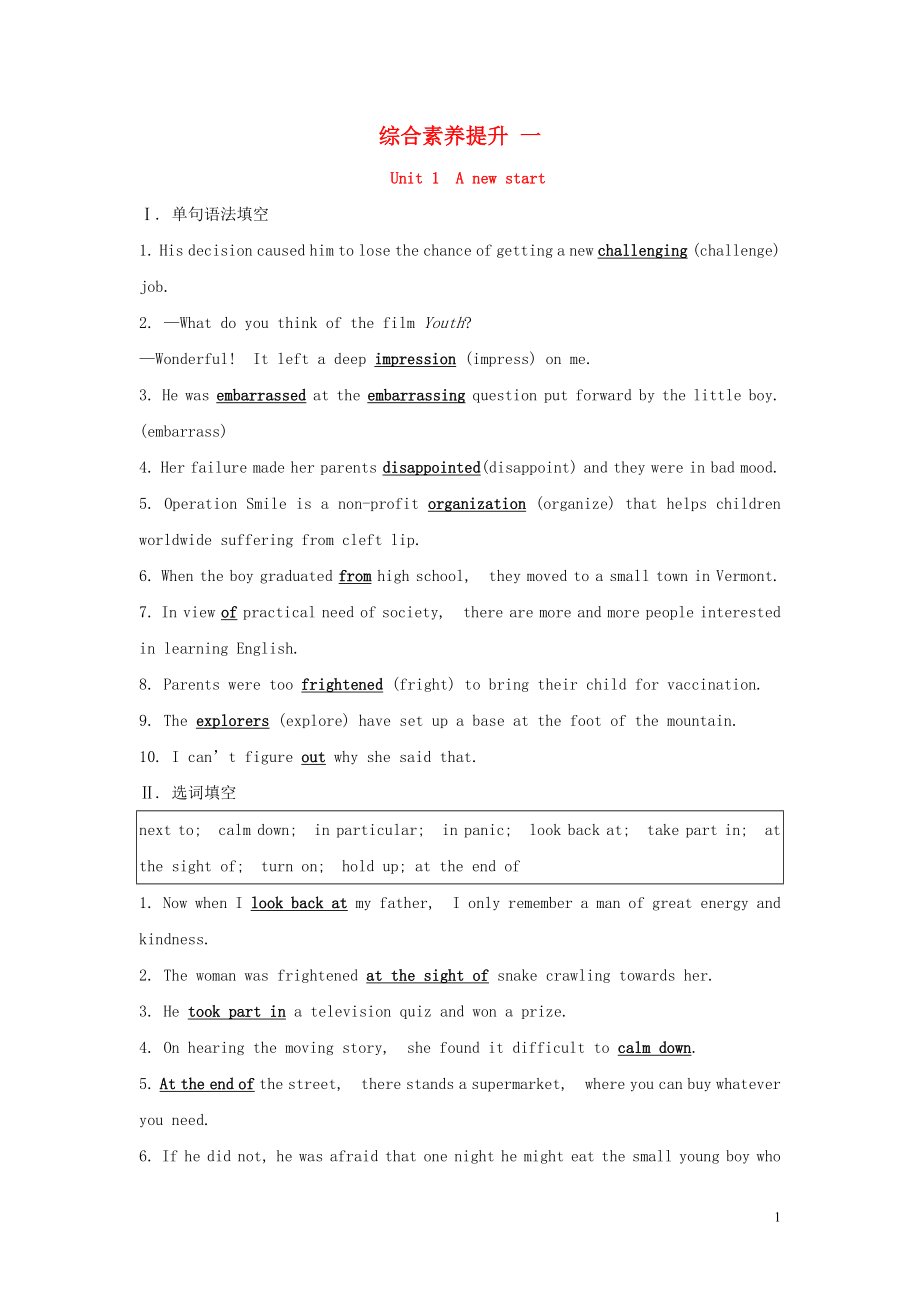《2020版新教材高中英語(yǔ) 綜合素養(yǎng)提升 一(含解析)外研版必修1》由會(huì)員分享���,可在線閱讀,更多相關(guān)《2020版新教材高中英語(yǔ) 綜合素養(yǎng)提升 一(含解析)外研版必修1(4頁(yè)珍藏版)》請(qǐng)?jiān)谘b配圖網(wǎng)上搜索�。
1、綜合素養(yǎng)提升 一
Unit 1 A new start
Ⅰ. 單句語(yǔ)法填空
1. His decision caused him to lose the chance of getting a new challenging (challenge) job.
2. —What do you think of the film Youth?
—Wonderful! It left a deep impression (impress) on me.
3. He was embarrassed at the embarrassing question put forward
2���、by the little boy. (embarrass)
4. Her failure made her parents disappointed(disappoint) and they were in bad mood.
5. Operation Smile is a non-profit organization (organize) that helps children worldwide suffering from cleft lip.
6. When the boy graduated from high school, they moved to a smal
3�、l town in Vermont.
7. In view of practical need of society, there are more and more people interested in learning English.
8. Parents were too frightened (fright) to bring their child for vaccination.
9. The explorers (explore) have set up a base at the foot of the mountain.
10. I can’t fig
4、ure out why she said that.
Ⅱ. 選詞填空
next to; calm down; in particular; in panic; look back at; take part in; at the sight of; turn on; hold up; at the end of
1. Now when I look back at my father, I only remember a man of great energy and kindness. ?
2. The woman was frightened at the si
5���、ght of snake crawling towards her. ?
3. He took part in a television quiz and won a prize. ?
4. On hearing the moving story, she found it difficult to calm down. ?
5. At the end of the street, there stands a supermarket, where you can buy whatever you need. ?
6. If he did not, he was afraid t
6���、hat one night he might eat the small young boy who slept next to him. ?
7. Sorry, I didn’t mean to hold everybody up.
8. Is there anything in particular I can help you with? ?
9. Has the gas company turned on the gas yet? ?
10. People ran into the streets in panic when the earthquake hit. ?
Ⅲ
7、. 英譯漢
1. She walks as if she were drunk, which makes us confused a lot.
她走路好像喝醉了似的, 這使我們感到非常困惑�����。
2. With a lot of homework to do, I feel very anxious.
由于有許多作業(yè)需要做, 我感到非常焦急����。?
3. How wonderful an idea it is!
一個(gè)多奇妙的主意啊!
4. A thirteen-year-old boy was sitting on the sofa watching TV when the
8、telephone rang.
一個(gè)十三歲的男孩正坐在沙發(fā)上看電視這時(shí)電話響了���。
5. He was able to make himself heard only by shouting at the top of his voice.
他只能通過(guò)最大聲的喊叫才能使別人聽(tīng)見(jiàn)他����。
6. If so, what would you do to grow these plants?
如果是這樣的話, 你怎樣來(lái)種植這些植物?
Ⅳ. 語(yǔ)法填空
Marie Curie was one of the 1. (much) famous and greatest people
9��、 of her time. Together with her husband Pierre, she was awarded the Nobel Prize in 1903, and she tried her best 2. (win) another in 1911. ?
Marie 3. (be) the daughter of a teacher. In 1891, she went to Paris to study physics and mathematics at the Sorbonne in 4. she met Pierre Curie
10��、, professor of the School of Physics. They got married in 1895. The Curies worked together researching radioactivity (放射性). At the end of 1898, they announced 5. discovery of radium. The Curies, were awarded the Nobel Prize for Physics in 1903. ?
Pierre’s life was cut short in 1906 when he
11���、was 6. (kill) by a carriage. Marie took over his teaching work, 7. (become) the first woman to teach at the Sorbonne. And she devoted herself to continuing the work that they had begun together. She received a second Nobel Prize for Chemistry in 1911. ?
Despite her 8. (succeed), Mar
12�、ie continued to face great objection from men 9. (scientist) in France, and she never received much money from her work. In the late 1920s, her health was beginning to become worse, and she died 10. July 4th, 1934 from high-energy radiation from her research. ?
【文章大意】本文介紹了居里夫人的生平事跡、貢獻(xiàn)以
13����、及成就。
1. 【解析】 most���?����?疾樽罡呒?jí)�。此處與greatest并列, 因此用famous的最高級(jí)���。故填most��。
2. 【解析】 to win��?���?疾榉侵^語(yǔ)動(dòng)詞�����。try one’s best to do sth. 竭盡全力做某事���。
3. 【解析】was�??疾閯?dòng)詞的時(shí)態(tài)。此處敘述過(guò)去發(fā)生的事情, 因此用一般過(guò)去時(shí)��。故填was���。
4. 【解析】which���。考查定語(yǔ)從句����。先行詞為Sorbonne, 表示地點(diǎn), 因此定語(yǔ)從句中介詞in后的關(guān)系代詞應(yīng)用which。
5. 【解析】the����。考查冠詞。 根據(jù)后置定語(yǔ)of radium可知此處表示特指, 故填the�����。
6. 【解析】kille
14�、d??疾閯?dòng)詞的語(yǔ)態(tài)。he是kill動(dòng)作的承受者, 因此此處應(yīng)用被動(dòng)語(yǔ)態(tài)�。故填killed。
7. 【解析】becoming����。考查非謂語(yǔ)動(dòng)詞�����。Marie與become之間為主動(dòng)關(guān)系, 故用現(xiàn)在分詞短語(yǔ)作狀語(yǔ)���。
8. 【解析】success���。考查詞性轉(zhuǎn)換�。介詞despite后用名詞作賓語(yǔ)�。
9. 【解析】scientists����??疾槊~的復(fù)數(shù)。根據(jù)句中的定語(yǔ)men可知此處應(yīng)用復(fù)數(shù)形式��。
10. 【解析】on��?����?疾榻樵~�。在某一天用介詞on。
Ⅴ. 微寫(xiě)作
根據(jù)提示完成短文����。
1. 他就要大學(xué)畢業(yè)(graduate)了。
2. 回顧(look back at)大學(xué)生活, 他很滿意��。
3
15�����、. 在這四年期間, 為了保持體形(figure), 他參加(take part in)了各種各樣的體育運(yùn)動(dòng)。
4. 更為重要的是, 他充分利用(make the most of)時(shí)間, 各科都學(xué)得不錯(cuò)���。
5. 因此他肯定(for sure)會(huì)得到一份好工作���。
【參考范文】
He will graduate from the university. Looking back at his college life, he is satisfied with it. During the four years, he has been taking part in all kinds of sports to keep his figure. More importantly, he has made the most of time and done well in all his subjects. Therefore, he will get a good job for sure.
4
 2020版新教材高中英語(yǔ) 綜合素養(yǎng)提升 一(含解析)外研版必修1
2020版新教材高中英語(yǔ) 綜合素養(yǎng)提升 一(含解析)外研版必修1

